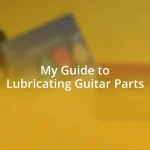Key takeaways:
- Understanding guitar electronics, including pickups and pots, is essential for achieving optimal sound quality and performance.
- Regular cleaning and maintenance of guitar electronics prevent issues like dirt accumulation, corrosion, and faulty connections, enhancing longevity and sound clarity.
- Recognizing the limits of personal expertise is important; seeking professional help for complex issues ensures proper care and maintenance for your instrument.

Introduction to Guitar Electronics
When I first picked up an electric guitar, I was both excited and overwhelmed by the complexity of its electronics. Understanding guitar electronics is crucial; they are the unseen force behind your sound, shaping every note and chord you play. Have you ever wondered why the tone of your guitar changes when you roll back the volume? It’s all thanks to the various components, like pickups, potentiometers, and capacitors working together, each playing a vital role.
The heart of your guitar’s sound lies in its pickups, which capture the vibrations of the strings and convert them into electrical signals. I remember the first time I swapped out a stock pickup for something with more character—it felt like giving my guitar a new voice. It’s amazing how such small changes can produce profound impacts on tone, isn’t it?
Beyond pickups, there are tone capacitors and volume pots that influence how the guitar interacts with your amp and pedals. I often find myself tinkering with these settings during practice sessions, experimenting to find that sweet spot where my sound truly resonates. Each element of guitar electronics contributes to the overall experience, and understanding them can enhance not just your equipment’s performance but also your playing journey.

Importance of Cleaning Guitar Electronics
Keeping the electronics of my guitar clean is something I’ve come to value deeply over the years. I’ve noticed that dirt, dust, and grime can silently degrade the performance of these critical components. For instance, I once had a frustrating experience during a gig when my connection was intermittent due to build-up in the input jack. That taught me firsthand how a little maintenance can save me from potential heartbreak onstage.
Regular cleaning can significantly enhance the longevity and performance of guitar electronics. Here are some reasons why it’s essential:
- Improved Sound Quality: Clean connections allow for clearer transmission of electrical signals, resulting in a more vibrant tone.
- Prevention of Corrosion: Dust and moisture can lead to corrosion, which damages components over time.
- Fault Prevention: Regular maintenance helps identify potential issues, such as loose wires or failing components, before they escalate.
- Smoother Operation: Clean potentiometers and switches function better, giving you consistent control over your sound.
- Enhanced Resale Value: A well-maintained guitar with clean electronics retains its value better on the market.
Trust me; taking a few moments to clean your guitar’s electronics can lead to a more enjoyable playing experience.

Tools Needed for Cleaning
To properly clean guitar electronics, having the right tools is essential. I often think of this as my “cleaning arsenal.” A proper set up can be the difference between a frustrating experience and a smooth maintenance routine. Common tools include a soft cloth, which I use to gently remove dust and fingerprints, and a can of compressed air to blow out any debris without touching the components. These tools help ensure that I’m not transferring dirt to sensitive areas.
In addition to these basics, I’ve found a few more specialized tools make the job easier. For instance, a small brush for reaching tight spots has been invaluable in my toolkit. I remember how, during one of my cleaning sessions, I discovered a buildup of dust in the pickup area that I missed before. With just a simple brush, I was able to access those corners and restore my guitar’s clarity.
Lastly, I can’t stress enough the importance of a good contact cleaner. I’ve encountered countless times where applying contact cleaner to the pots revived their smooth operation. Once, I was amazed after a thorough cleaning session, specifically when treating the volume pot. The transformation was instant; it’s like I had a brand-new guitar in my hands! Investing in quality cleaning tools truly pays off in the long run.
| Tool | Purpose |
|---|---|
| Soft Cloth | Dust and grime removal |
| Compressed Air | Clearing out loose debris |
| Small Brush | Reaching tight spots |
| Contact Cleaner | Cleaning potentiometers and switches |

Step by Step Cleaning Process
The first step in my cleaning process is to unplug my guitar and gather my tools. I remember the first time I forgot to do this—let’s just say it was a jolting reminder to prioritize safety! With everything set up, I start off with the soft cloth to wipe down the exterior of the guitar, paying special attention to any fingerprints or smudges that have accumulated over time. It’s amazing how much of a difference a simple wipe can make.
Next, I tackle the electronics more meticulously. Using compressed air, I blast away any dust from the input jack and around the pots. I can still recall the satisfying whoosh of air as it puffed out years’ worth of gunk. It’s like giving my guitar a breath of fresh air! After that, I switch to my small brush to carefully clean areas that the cloth and air couldn’t reach—especially those little crevices where dust likes to hide. Sometimes I wonder how such tiny spaces can hold so much dirt!
Finally, I apply contact cleaner to the potentiometers and switches. This step always feels like hitting the refresh button on my guitar. I often think about how a simple cleaning can radically improve my playing experience. It’s like reviving a stagnant relationship—suddenly, everything feels new again! Just a few drops do the trick, and I love hearing the smoothness return when I turn the knobs. This whole process not only enhances my guitar’s functionality but also deepens my connection with the instrument.

Tips for Maintaining Guitar Electronics
When it comes to maintaining guitar electronics, I’ve realized that consistency is key. I try to set reminders to clean my guitar’s electronics every few months. It’s easy to overlook these components, but each time I skip it, I feel the impact in my playing. Have you ever noticed how a subtle crackle can disrupt your practice session? Keeping a regular maintenance rhythm not only prevents those frustrating moments but also ensures that my guitar sounds its best every time I pick it up.
Another tip is to be gentle—almost like treating a delicate flower. I always approach cleaning with a soft touch and a mindful attitude. I remember the first time I accidentally yanked on a wire while cleaning. That led to a week of silence from my favorite guitar! Now, I have a gentle hand and go slow, appreciating each part of the instrument. It’s amazing how being careful not only protects the electronics but also allows me to connect with my guitar on a more personal level.
Lastly, I believe in using the right products, and I’ve learned the hard way what doesn’t work. I had a moment when I tried a generic spray cleaner that left a residue I could never quite remove. Now, I stick to products specifically made for guitars. I often ask my fellow musicians for recommendations, and it’s interesting to hear about their experiences. Finding the right cleaning supplies has been a game-changer for me—just like a well-tuned guitar, it makes the entirety of my playing experience so much richer!

Troubleshooting Common Issues
It’s not uncommon to encounter issues like unwanted noise or crackling sounds when playing. I still remember one session where a persistent hissing made me want to throw my guitar out the window! After some troubleshooting, I realized the culprit was simply dust accumulation around the pots. A quick cleaning made all the difference; the sound clarity returned, and I felt that familiar joy of effortless playing.
Sometimes, I’ve found that my guitar pick-ups can lose their punch. This usually happens when I neglect the maintenance. I can recall a time when my tone felt flat, almost lifeless, and it baffled me. After some investigation, it turned out that all they needed was a gentle cleaning to restore their vibrancy. That experience reminded me how a little care can breathe new life into the music I create.
When it comes to troubleshooting, I always emphasize the importance of taking notes. I’ve learned to jot down any issues I encounter during cleaning sessions, including the remedies I applied. It may sound tedious, but it’s proven invaluable. I once had a memory lapse about what worked to fix a buzzing sound, and my notes saved me from repeating mistakes. Keeping a log not only helps me remember but also allows me to track any recurring issues—who knew that simple step would make my guitar maintenance journey so much smoother?

When to Seek Professional Help
Sometimes, it becomes clear that certain issues go beyond my expertise, and that’s when I know it’s time to seek professional help. I once faced a scenario where my guitar had a grounding issue. After poking around for an hour, I realized that I was out of my depth, and it ended up costing me more time and stress. Have you ever been stuck in a similar situation? I took it to a professional, and they fixed it in no time, teaching me a valuable lesson about recognizing my limits.
It can be challenging to admit that I need assistance, but I’ve learned that not every problem can be resolved at home. There was one occasion where I was convinced I could change a pickup myself, but I ended up with a mess of wires and a lot of regret. The frustration of spending hours on a project with no success left me feeling defeated. Now, whenever I face complex electronic issues, I remind myself that a professional touch often ensures my guitar gets the best possible care and stays in peak condition.
I’ve also realized that the age and condition of my guitar can indicate when it’s time to call in an expert. Older models, especially, may have components that are fragile or require specialized tools for maintenance. I remember a vintage guitar I cherished; after several attempts to fix a faulty jack, I decided to bring it to a luthier. Their expertise not only restored the guitar’s functionality but also preserved its original charm. Having that expert eye on my instrument made me appreciate the craftsmanship even more. Have you had a similar experience? Seeking professional help can be a wise investment when it comes to preserving the soul of your beloved guitar.















